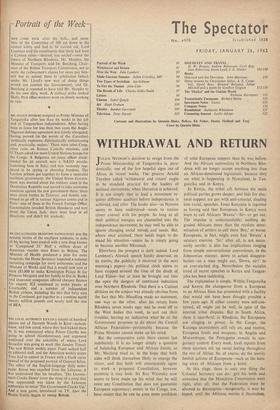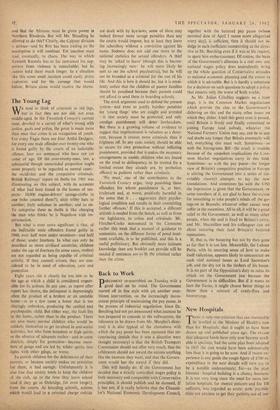WITHDRAWAL AND RETURN
JJuuus NvERERE's decision to resign from the Prime Ministership of Tanganyika is, para- doxically, one of the few hopeful signs out of Africa in recent weeks. The process Arnold Toynbee called 'withdrawal and return' ought to be standard practice for the leaders of national movements, when liberation is achieved. It is not simply that to lead a movement re- quires different qualities before independence is achieved, and after. The leader also—as Nyerere seems to have understood—needs to restore closer contact with his people. So long as all their political energies are channelled into the independence movement, he may well be able to ignore changing social moods and needs. But, uhura once attained, these needs begin to de- mand his attention—unless he is simply going to become another Nkrumah.
Elsewhere the prospect is dark indeed. Lord Lambton's Alnwick speech hardly deserved, on its merits, the publicity it received in the next morning's papers—his political clock seems to have stopped around the time of the death of Lord Eldon—but at least he brought out into the open the dangers of continued indecision over Northern Rhodesia. That there is a Cabinet division on the subject was already obvious from the fact that Mr. Maudling made no statement, one way or the other, after his return from Rhodesia seven weeks ago; and he went off to the West Indies this week, to sort out their troubles, leaving no indication what' he or the Government proposes to do about the Central African Federation—presumably because the Prime Minister cannot make up his mind.
But the comparative calm there cannot last indefinitely. It is no longer simply a question of balancing European and African forces, as Mr. Macleod tried to, in the hope that both sides will think themselves likely to emerge the victor, and that both will consequently agree to work a proposed Constitution, however eccentric it may look. Sir Roy Welensky now seems to have made up his mind that he will resist any Constitution that does not guarantee European supremacy; events in the Congo, too, have meant that he can be even more confident of solid European support than he was before. And the African nationalists in Noethern Rho- desia will no longer accept anything less than an African-dominated legislature; because they see what is happening in Nyasaland, in Tan- ganyika and in Kenya.
In Kenya, the tribal rift between the main political parties grows deeper; and bids for elec- toral support are put with anti-colonial, shading into racial, speeches. Jomo Kenyatta is reported as having said that Europeans in Kenya must learn to call Africans 'Bwana'—Sir—or get out. The impulse is understandable; nothing de- graded Africans more than the resolute deter- mination of settlers to call them 'Boy,' or worse. Europeans, in fact, might even find `Bwana' a salutary exercise. 'Sir,' after all, is not neces- sarily servile; it also has implications ranging from simple conversational convenience, in the Johnsonian manner, down to actual disappro- bation—as a man might say, 'Down, sir!' to an over-excited dog. Nevertheless the racialist trend of recent speeches in Kenya and Tangan- yika has been saddening.
The explanation is simple. Within Tanganyika and Kenya the changeover from a European to an African State has proceeded with a facility that would not have been thought possible a few years ago. If either country were self-con- tained, all might yet be well, in spite of the internal tribal disputes. But in South Africa, there is apartheid; in Rhodesia, the Europeans are clinging to power; in the Congo, the Katanga secesiionists still rely on, and receive, European funds and weapons; in Angola and Mozambique, the Portuguese remain in san- guinary control. Every week, fresh reports from these quarters stir up racial feeling throughout the rest of Africa. So, of course, do the merely foolish actions of Europeans—such as the turn- ing away of Africans from a hotel.
At this stage, there is only one thing the Colonial Secretary can do: grit his teeth and announce that the Monckton Commission were right, after all; that the Federation must be allowed to disintegrate—temporarily, it may be hoped, until the Africans restore it themselves, and that the Africans must be given power in Northern Rhodesia. But will Mr. Maudling be allowed to do this? Clearly, .the Cabinet division is serious—and Sir Roy has been trading on the assumption it will continue. Yet inaction must lead, eventually, to chaos. The way in which Kenneth Kaunda has so 'far restrained his sup- porters from violence is remarkable; but he cannot hold them much longer. In a situation :ike this some small incident could easily prove explosive; and for the carnage that would follow, Britain alone would receive the blame,







































 Previous page
Previous page